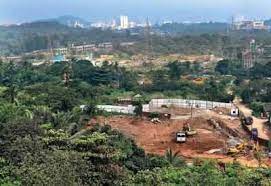MORE than 1.3 billion people and no Greens? More than 1300 political organisations and hardly any Green organisations! The answer is both ‘yes’ and ‘no’ in an ‘irresponsible’, ‘uncontrolled’, ‘unorganised’, ‘indisciplined’ and ‘chaotic’ democracy with ‘little civic sense’ called India. ‘Yes’ because even after more than six decades of Independence, Indians have not been able to broadly think about forming an organisation at the national level with explicit Green political goals. And ‘no’ because there are hundreds of social and civil society organisations and conscientious individuals working towards the Green agenda in a nonchalant way, without gauging their political affiliations or formulations and without being termed as Greens.
Actually, majority of Indians are so entrenched in run-of-the-mill kind of politics due to neo-liberal economic pressures that they have no time to think differently i.e. from an ecological viewpoint. And those who think about Green politics are not considered as ‘politicians’ in the real sense; they are considered just as ‘activists’ who may have the guts to fight against the government’s anti-people policies but no ‘capability’ to get people’s mandate to rule. Perhaps, this negative thinking makes the ‘activists’ indifferent towards forming parties that subscribe to the Green ideologies in their respective states or regions. It is strange that the people prefer to forget that these ‘activists’ are more committed to the politically correct environmental goals; and that they are always more knowledgeable on ecological issues than the average run-of-the-mill type of politicians.
The point is that if these people have the will, hundreds of organisations and several hundred thousand of individuals will automatically rally behind them and make these ‘activists’ their leaders!
Talking about the possibility of Green organisations in India, their future global and local roles and role in the Global Greens is difficult at this stage, as difficult as to sum up the highly populated India’s mammoth socio-economic problems that have actually converted into serious environmental issues.
However, it is pertinent to mention that already a sizeable population and most of the socio-political organisations think Green without knowing that they are Greens. It seems that in India, the ‘Green’ intelligentsia does not want to be restricted terminologically. We had or have people from Gaura Devi, Sunderlal Bahuguna and Chandi Prasad Bhatt to the many contemporaries like Medha Patkar, Arundhati Roy, Colin Gonsalves, Rajendra Singh, VS Jose, Suresh Sharma, BD Sharma, Narendra Singh, Dr. Dinesh K. Mishra, Sunita Narain, Claude Alvares, Darryl D’Monte, Y. David, Sanjay Parikh, MC Mehta, Harsh Mander, Ramaswamy R. Iyer, ND Jayal, PC Tewari, Ritwick Dutta, Dr. Shekhar Singh, Vijay Pratap, Radha Bhatt, SP Udayakumar, Gopalkrishna, Dr. Sudhirendar Sharma, Suresh Bhai, Dr. RK Pachauri, Mike Pandey, Devinder Sharma, MC Mehta, Hemanth, Sripad Dharmadhikary, Himanshu Thakkar, Bittu Sehgal, Bedi brothers, Jagat Singh Jungli, Anandi Sharan, Hartman de Souza, VS Roy David, Vijay Jardhari and many more, who have been working relentlessly in their own ways and according to their capabilities towards ecological democracy in the country. Some of these are campaigning to save traditional seeds, some are the water warriors and others are with the indigenous people to save their lands, water and forests. And a few of them are just writing articles on the ecological issues or doing some innovative things in the relevant fields.
Except a few, most of these activists and the members of the Indian civil society dare not come forward to form a political organisation that can boast of the Green politics. It is high time that these right thinking people come together and do some thinking that the politics is the process by which decisions are taken and Green politics is the historical need that will ensure adequate distribution of power within the Indian society. The current realities also demand that we put our heads together and commit ourselves to the cause of Green politics. We, as a nation, are facing the threats of ecological disasters as also the threats of the genetically modified foods, genetically engineered agricultural products and organisms. The combination of chemicals and genetically modified crops is also enhancing the speed of the worst environmental disaster in our country.
But there are other hurdles too. The burden of the neo-liberal policies imposed on the people, under the garb of general human good, is one of the main obstacles. All the nature’s gifts including lands, forests and water are being snatched away to make them tools of invisible and most of the times invincible exploitation. The biodiversity of flora and fauna is being destroyed to ultimately enslave the people. The private control of nature’s gifts what they call as natural resources is an invasion not only on the livelihoods of particularly those indigenous people who dwell in the forests but also on everybody’s sovereign right to live with dignity and with a sense of freedom and independence.
The corporate-oriented agriculture system has pushed the traditional farming communities into debt and death trap. The corporate agriculture system has destroyed farmers’ fundamental right to the respectful and dignified living. Days are gone when agriculture in India was considered the most respectable vocation. Today, millions of farmers have either to look for alternatives to survive in the parched world or just commit suicide. Nobody would believe but more than 150,000 farmers have committed suicide since 1993.
This situation has been created because of the existence of the anti-people, anti-farmer and anti-nature policies and laws that are making easier the takeover of nature and besides paving ways to hijack our ecological heritage that is interspersed with the socio-cultural nuances. In a nutshell, the multinational corporations – foreign as well as Indian – in collusion with the plump politicians and corruptibly burgeoning bureaucrats have held the marginalised people to ransom.
And most dangerously, the science and technology have been converted into slaves to serve not only the narrow vested interests of the terminators called MNCs/TNCs but also of the government that is bent upon going in for the so-called ‘clean’ nuclear energy in a big way by collaborating with the rich nations that see India more as a big market for their products including weapons and uranium.
In the circumstances, we need to start a peaceful struggle against these man-made onslaughts and take the Green Movement to its logical culmination in India. Also, we need to liberate all nature’s gifts, human skills and science and technology and use them for the common good of all humans and other species. There cannot be any place for the greed of a few rich because we are more accountable to those more than 800 million poor who are forced to live on less than meagre 20 rupees (50 cents) per day or $2 per day on the basis of purchasing power parity. We also need to understand that the gross domestic produce is increasing not due to our manufacturing or agricultural production, but due to the increase in the consumption of foreign goods and exploitation of nature’s gifts by the large MNCs with committed goals of profit making. The call of the hour is to listen to what MK Gandhi, India’s Father of the Nation, and to the American thinker, Thoreau, told long back on the need for austere lifestyles.
But the reality is that the nature is being exploited, ruined and damaged beyond extents from where it can’t recover itself. The whole nature has been put to ransom just to increase profits of the MNCs and multiply their wealth. The greed has led to the use of highly poisonous and non-biodegradable synthetic chemicals in agriculture and industry that are playing havoc. All the components of environment – soil, water, air – have been poisoned beyond permissible limits. And, these poisons have already reached the food chain and therefore to all living beings. However, the greed needs to be checked so that there is no scope for the socio-cultural and economic exploitation of the poor and needy.
The processes of socio-economic and ecological change have also affected the role of women and the adivasis (the indigenous people or tribals) in the local economies. There has not been adequate appreciation of the broad-based knowledge of women and adivasis about their local environments and how this contributes to issues of food security and domestic welfare. For example, in the mountainous state of Uttarakhand, women’s contribution in ‘Chipko’ (save the trees movement), ‘Nasha Nahin Rozghar Doh’ (give employment, not liquor movement) and the movement for full-fledged state for the Central Himalayan Region or Uttarakhand has been immense. But, their role has not been recognised properly despite the fact that the integration of women in the processes of society is a key component to gain their perspective. Similarly, neglect towards sustainable cultures of adivasis or indigenous people living in forests or remote areas is a serious matter.
Water is yet another critical issue in India. The poverty-stricken regions in the country tend to be in the climatic zones subject to drought and other water problems like highly uneven spatial distribution. In next 20-30 years or so, five more river basins are feared to be extinct and that within next 80-100 years, most of the glaciers will have disappeared. For the 21st century, therefore, water management must take an innovative Green course.
The essence of the planning has, therefore, to be guided by the ecological and environmental priorities. Unless these priorities are established, social welfare is not likely to be created by the unplanned operation of the various institutions. An understanding of local ecosystem processes, the organisational mechanisms through which communities interact with their physical environments, social dynamics at both the household and community levels, and local priorities are crucial components in ensuring the success of conservation efforts. Also, there is a need for access to the environmentally sound technologies to achieving sustained economic growth and politically correct development. It is unfortunate that the developed nations have not taken interest in this. The implementation of commitments on transfer of environmentally sound technologies and technical know-how, has, in fact, been disappointing.
The imperatives to tackle the legacy of political, economic and social marginalisation that makes the Indian communities vulnerable to the heavy weight of the so-called contemporary socio-economic growth and the effects of poverty are growing. The multiplicity of ethnic and cultural diversity presents a serious challenge to efforts to articulate and operationalise strategies that are viable across a wide region.
Apart from this, there is a vital need to analyse in greater depth the complex relationship between prosperity, poverty and environmental degradation. Given the enormous diversity of the ecosystems, cultures, adaptive strategies, and modes of linkages to the wider political economy, this will require a substantial commitment in time and money, besides activists’ intense participation. It is, however, vital in order to develop a comprehensive understanding of ecological systems, forms of community organisation and potential leaders.
Therefore, a Green party is needed in India at the national level. The initiative currently in the name of the Uttarakhand Parivartan Party (Party for Change in the northern state of Uttarakhand or Central Himalayan Region) – that began in January 2009 – is just a stepping-stone that hopefully ignites the Indian imagination to form a Green party at the national level. The Green political process in the Central Himalayan Region already has its policies and ideologies in place and a system to run the organisation is also taking better shape.
As the Green political process in a small mountainous Indian state with just eight million people – where several ecological and environmental movements happened in the past – has taken place, a similar effort is slowly taking shape in the southern Indian state of Tamil Nadu under the leadership of Mr. Y. David and others. These people have been leading the environmental movements in the state over the years.
If these two experiments become a reality, Indian can think of a Green party at the national level in the times to come. In fact as regards the Greens in India, they have a great vision for the future. The efforts made by one of our colleagues, Anandi Sharan, in this direction, need to be mentioned here.
All of us are already opposing tooth and nail the government’s several anti-people environmental policies including the government’s decision to establish linkages among the river systems of the country. We know that if this over-ambitious and phenomenally expensive project takes off at all, it will be a disaster with endless physical proportions and cause massive displacement of humans, disconnect them from their lands, indigenous cultures and ethos. Besides, damage extensively ecology/ biodiversity, finish thousands of species, and cut through millions of hectares of agricultural and forest lands.
Instead of thinking about such linkages, the Indian government must draw an effective strategy with the help of people for solving the inter-state disputes over sharing of waters and also engage them in the efforts to judiciously use and save water. Groundwater use patterns also need immediate attention at all levels.
As the Global Greens has a big and significantly role to play at the various levels in the near future, particularly in the midst of gloomy debates on the global warming due to greenhouse gases, etc., the Indian Greens will have the responsibility to replicate Global Greens’ work at the national level primarily and play its role in the collective and cohesive international efforts. This, of course, need the steps to create a set of policy guidelines to be integrated into economic and social policy and planning, which will be designed to identify needs, priorities and constraints of the communities. Therefore, there is an urgent need for a comprehensive ecological strategy and existence of the Green parties to implement them.
Hopefully, there is already a broad consensus among the Indian civil society and the Green intelligentsia that the solutions are possible indigenously and good use of science and technology can only enhance the process of common good. This, of course, is something to begin with!
New Delhi, November 8, 2012.




